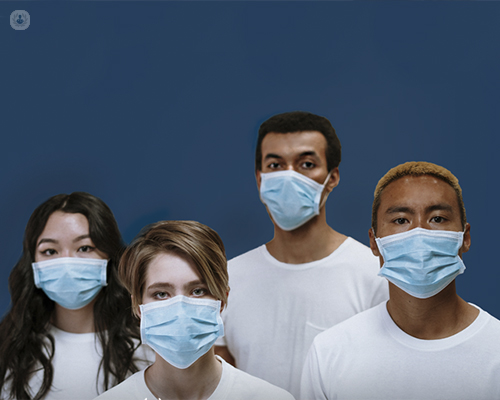Face masks: should I be wearing one during the COVID-19 pandemic?
Escrito por:Health Secretary Matt Hancock has stated that the UK government's stance on face masks has not changed. The Scottish government however, is now recommending that people use face coverings when on public transport and in shops.
The UK Government's scientific advisory committee, Sage has stated that there is "weak evidence" that masks worn by the public would prevent infections from spreading.

Why isn't everyone wearing a face mask in the UK?
There are only two groups of people should wear protective masks according to The World Health Organization (WHO) . Those who are
- sick and showing symptoms
- caring for people suspected to have COVID-19
Masks haven't been recommended for the general public by WHO because:
- they can be contaminated by other people's sneezes and coughs, or when removing them or putting them on.
- social distancing and frequent hand-washing are more effective
- they may offer a false sense of security
The European Centre for Disease Prevention and Control also agrees that medical face masks should be prioritised for healthcare workers. Despite this they’ve also highlighted that non-surgical face masks might help stop the spread of COVID-19 by people who are contagious but are asymptomatic.
According to leading Scientists in Singapore, the risk of spreading the novel coronavirus may be especially high within the 24-48 hours before an infected person is even aware they may have COVID-19.
The virus that causes COVID-19 is spread by droplets that can spray into the air when those who are infected cough, talk and sneeze. These can enter the body through the nose, eyes and mouth, either directly or after touching a contaminated object.

What is the UK's advice on face masks during the pandemic?
The Scottish government's latest guidance and suggestions recommend people use cloth coverings, such as a scarf, rather than "medical grade face masks". According to their guidance, face coverings should not be used for children under the age of two years.
11 days before, London mayor Sadiq Khan said face masks should be compulsory to wear on public transport in the capital and urged people to use non-medical face coverings, such as a bandana or scarf, when social distancing is not possible.
However, advice for England, Wales and Northern Ireland has not changed and masks have not been recommended.
The UK government have previously raised concerns about whether recommending wide usage of masks to the public could result in shortages of medical face masks for the NHS.
What face masks are currently used by health workers?
Different types of mask offer different levels of protection. The most protective mask is an FFP3 or, alternatively, an N95 or an FFP2. These have been used in hospitals.
According to the UK government, NHS staff in lower-risk situations can wear a surgical mask. This includes healthcare workers within one metre of patients with possible or confirmed cases of COVID-19.
The widespread use of face masks by the public could put NHS supplies at risk, according to Chris Hopson, chief executive of NHS Providers.
Where can I get a mask?
In many pharmacies across the UK, masks are out of stock as well as those used for home improvements in many DIY stores.
It can be difficult to know how safe some masks are and prices are often high.
Health Secretary Matt Hancock has also highlighted that, unlike in France, the government cannot promise free masks for the general public if required. "It would be an extraordinary undertaking".
What about homemade face masks?
There is lots of advice online about how to make face masks, although these DIY masks haven't been recommended by the UK government
Some of the suggestions include using common household materials, such as cotton fabric from old bedding or T-shirts. The downside is that homemade masks are not regulated, whereas officially made ones have to meet safety requirements .

European advisers have not recommended reusable cloth masks and have highlighted they may even increase the chance of infection.
They believe there is a high chance virus particle could go through the cloth and moisture in it could retain the virus.
The US Centers for Disease Control and Prevention however, is recommending DIY face masks and has said cloth face coverings should:
- be secured with ties or ear loops
- fit snugly but comfortably against the side of the face
- allow for breathing without restriction
- include multiple layers of fabric
- be able to be laundered and machine dried without change to shape or damage.
Ultimately, there is conflicting advice from different sources. For now, what is certain, is that good hygiene habits should be practised throughout the pandemic. Have a read of our other medical articles for more health advice during the pandemic.


